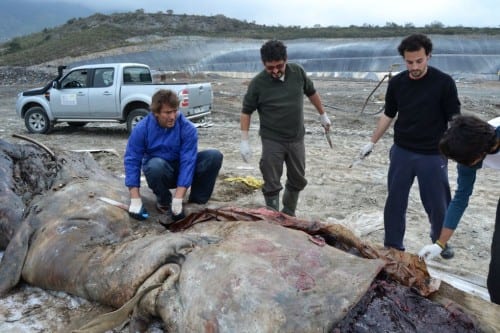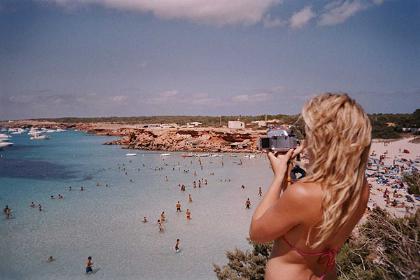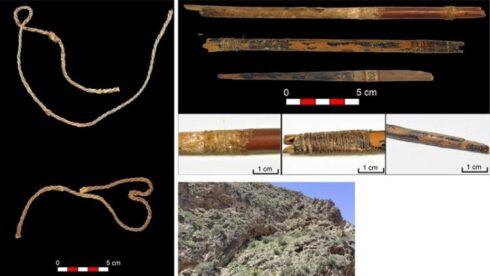By Frances Leate
A WHALE that was found washed up on the coast of Granada died from swallowing plastic according to scientists.
The ten metre long, 4.5 ton sperm whale was discovered dead on the beach in Castell de Ferro.
The whale was one of several that has been found washed up on the shores of Andalucía and government officials called in experts from Doñana Biology Station to take samples from the animal and find out how it died.
The biologists were shocked to discover 59 pieces of plastic sheeting, of the type used by nearby greenhouses to protect crops, inside the whale.
The animal had ingested nearly 18 kilograms of the material.
It was also discovered that the whale had swallowed nine metres of the kind of rope used to hold the plastic sheets down, as well as two hoses, measuring 4.5 metres.
The plastic had caused one of the whale’s stomachs to burst, leaving it dead.
In 2008, the Olive Press launched a campaign to ban plastic bags in an attempt to stop them filling up landfill sites and cause havoc to the environment.
It is thought a single plastic bag can take up to 1,000 years to degrade and in the meantime gets swallowed by whales or caught on the flippers of sea turtles.
As well as the large amounts of plastic discovered in the whale, biologists also discovered two flower pots a spray can and various other pieces of rubbish that had been thoughtlessly dumped into the sea.
Renaud de Stephanis, who led the investigation, said he was shocked and saddened at the discovery.
He said: “I was thinking, ‘Who on earth put plastic in here?’ The stomach had exploded and the gastric contents had ended up in the abdominal cavity,”
De Stephanis, who spent several summers in Almería, recognized the objects as typical of the greenhouses that cover much of the coast between Murcia and Málaga.
Plastic is a leading cause of death for 250 marine species, including fish, turtles and birds.
It is thought that sperm whales dive as far as 1,000 meters down in search of squid, and that they may mistake plastics for prey or swallow it accidentally.











The plastic greenhouses than blight the Spanish coast should be banned. They are an eyesore and environmentally unacceptable. Farmers never clean or maintain the older structures, leaving them to decay for decades.
No surprises there, as every self-respecting cateta and campesino knows the rivers and sea were put there by God to chuck rubbish into, if you can’t find a handy verge first that is.
It doesn’t even need to be dumped directly into the sea – the strong winds we get here will often tear the degraded plastic sheeting from its frames and take it seawards. I agree – the sheeting should be banned. We need to find an alternative to plastic – it is lethal to wildlife – world wide.
And new Invernaderos / Plastic Grrenhouses are still being constructed which means levelling huge areas for them with no thought to wildlife on the land.
Not necessarily coming from Spain!! I’m working in Africa right now and they are throwing absolutely every thing into the sea!! It’s awful :-(